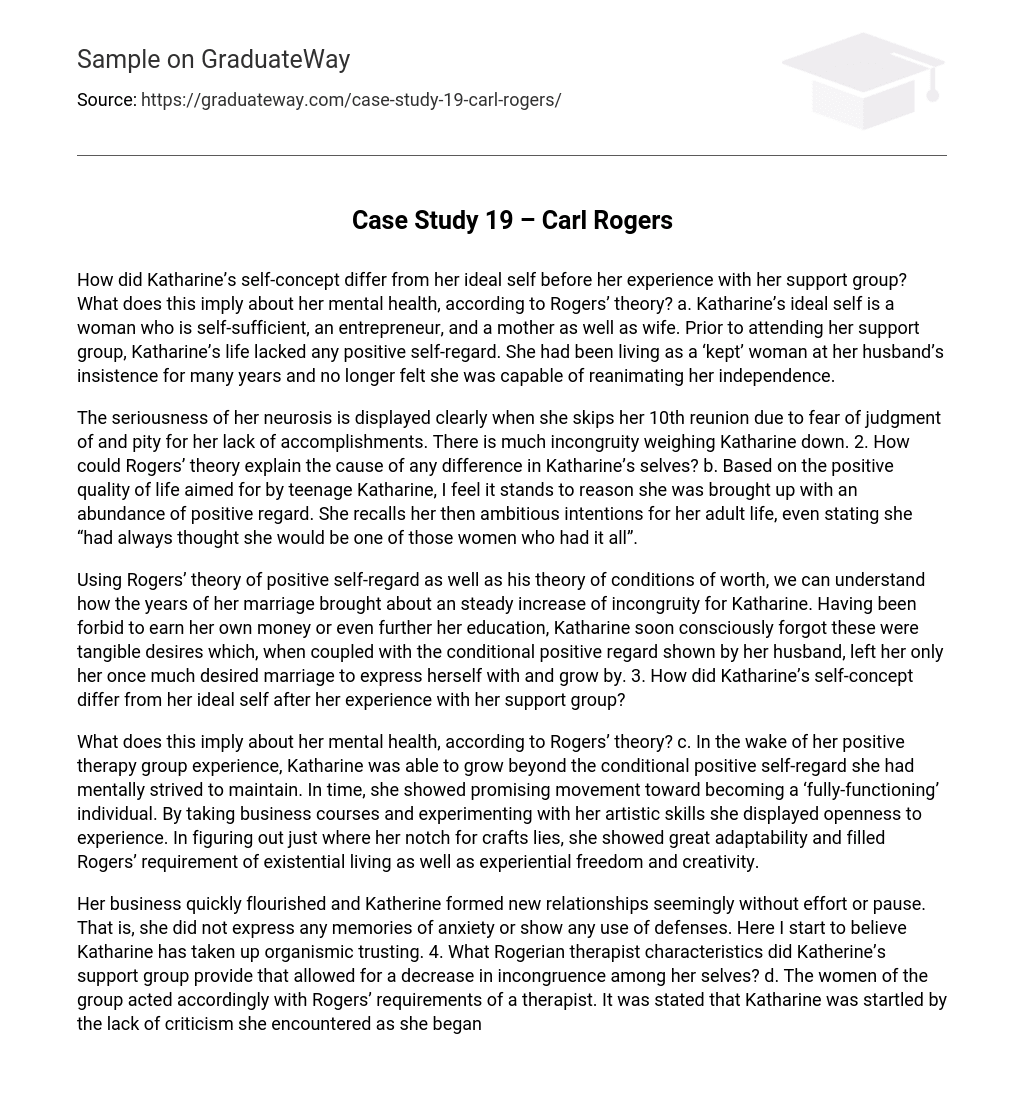How did Katharine’s self-concept differ from her ideal self before her experience with her support group? What does this imply about her mental health, according to Rogers’ theory? a. Katharine’s ideal self is a woman who is self-sufficient, an entrepreneur, and a mother as well as wife. Prior to attending her support group, Katharine’s life lacked any positive self-regard. She had been living as a ‘kept’ woman at her husband’s insistence for many years and no longer felt she was capable of reanimating her independence.
The seriousness of her neurosis is displayed clearly when she skips her 10th reunion due to fear of judgment of and pity for her lack of accomplishments. There is much incongruity weighing Katharine down. 2. How could Rogers’ theory explain the cause of any difference in Katharine’s selves? b. Based on the positive quality of life aimed for by teenage Katharine, I feel it stands to reason she was brought up with an abundance of positive regard. She recalls her then ambitious intentions for her adult life, even stating she “had always thought she would be one of those women who had it all”.
Using Rogers’ theory of positive self-regard as well as his theory of conditions of worth, we can understand how the years of her marriage brought about an steady increase of incongruity for Katharine. Having been forbid to earn her own money or even further her education, Katharine soon consciously forgot these were tangible desires which, when coupled with the conditional positive regard shown by her husband, left her only her once much desired marriage to express herself with and grow by. 3. How did Katharine’s self-concept differ from her ideal self after her experience with her support group?
What does this imply about her mental health, according to Rogers’ theory? c. In the wake of her positive therapy group experience, Katharine was able to grow beyond the conditional positive self-regard she had mentally strived to maintain. In time, she showed promising movement toward becoming a ‘fully-functioning’ individual. By taking business courses and experimenting with her artistic skills she displayed openness to experience. In figuring out just where her notch for crafts lies, she showed great adaptability and filled Rogers’ requirement of existential living as well as experiential freedom and creativity.
Her business quickly flourished and Katherine formed new relationships seemingly without effort or pause. That is, she did not express any memories of anxiety or show any use of defenses. Here I start to believe Katharine has taken up organismic trusting. 4. What Rogerian therapist characteristics did Katherine’s support group provide that allowed for a decrease in incongruence among her selves? d. The women of the group acted accordingly with Rogers’ requirements of a therapist. It was stated that Katharine was startled by the lack of criticism she encountered as she began sharing her ideas and lost desires with the group. Congruence) The women encouraged Katharine to attend business courses and to explore her artistic abilities as she secretly had wished to do. (Empathy) Only with their guidance and unconditional positive regard (Respect) was she able to overcome her anxieties and progress toward self-actualization. I chose the case study from the point of Carl Rogers, not because I appreciate his approach any more than I might Maslow’s or Fromm’s, but because he graduated from the University of Wisconsin; a school which I, myself, have previously attended and whose reputation for outstanding academic graduates I believe in.





